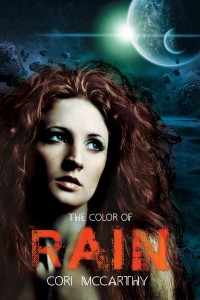When people think of books for children and teens that address social justice issues, contemporary and historical fiction and nonfiction are the genres that come to mind. Rarely do we think of speculative fiction as inherently political, though dystopian novels like Suzanne Collins’s The Hunger Games and M.T. Anderson’s Feed serve as warnings of the society that may emerge if present trends continue.
 Cori McCarthy’s debut novel The Color of Rain (Running Press Kids) is a compelling new work of dystopian science fiction, one that addresses issues of class, gender, and the ways that those in power scapegoat the weak in order to maintain their power. Sixteen-year-old Rain lives with her 12-year-old brother, the only surviving member of her family, in an abandoned greenhouse in a barren Earth City. Her brother, Walker, is one of the Touched, suffering from a neurological ailment similar to Alzheimer’s, and like the rest of the Touched, he is pursued by the police. Believing that a cure is available on a faraway planet at the other end of the Void, Rain agrees to become a prostitute on a spaceship commanded by vicious Johnny in exchange for bringing Walker onto the ship. Johnny chooses Rain as his special concubine because of her red hair, but Rain finds herself attracted to Johnny’s servant, Ben, a highly intelligent Mec from the planet where the cure is supposedly available.
Cori McCarthy’s debut novel The Color of Rain (Running Press Kids) is a compelling new work of dystopian science fiction, one that addresses issues of class, gender, and the ways that those in power scapegoat the weak in order to maintain their power. Sixteen-year-old Rain lives with her 12-year-old brother, the only surviving member of her family, in an abandoned greenhouse in a barren Earth City. Her brother, Walker, is one of the Touched, suffering from a neurological ailment similar to Alzheimer’s, and like the rest of the Touched, he is pursued by the police. Believing that a cure is available on a faraway planet at the other end of the Void, Rain agrees to become a prostitute on a spaceship commanded by vicious Johnny in exchange for bringing Walker onto the ship. Johnny chooses Rain as his special concubine because of her red hair, but Rain finds herself attracted to Johnny’s servant, Ben, a highly intelligent Mec from the planet where the cure is supposedly available.
Rain soon discovers that things aren’t as Johnny promised. The ship will not be going to the Edge for a cure but to deliver over a thousand Touched—including perhaps Walker—to work as slaves in another planet’s mines. Johnny is part of a syndicate of high-tech pirates, slave traders, and sex traffickers. Like many sex workers in the past and today, Rain is sucked into her profession by poverty, desperation, and promises of a better life, and she soon finds that there is no escape. Life for the wealthy and privileged means every desire, no matter how venal, is satisfied. Life for the poor consists of hunger, indignity, and danger that only end with death. With the exception of the seemingly unattainable Edge, the planets’ government and laws seem only to exist to maintain the power of the few by dividing and instilling fear in the many; as Rain observes, “The cops in Earth City tried to make the Touched disappear, but all they did was sever our society into pieces too small to function. Too small to thrive.”
The Color of Rain is a gripping page-turner with much to say about our own world and what can happen if we choose money and status over people. Cori McCarthy is a young writer to watch, with a gift for storytelling and important things to say.
4 comments for “Human Trafficking in Space: A Review of The Color of Rain”